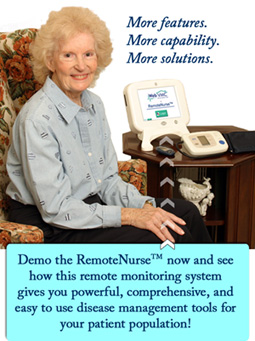"We selected WebVMC as we feel it is clearly the 'best of breed' technology available in home healthcare monitoring, empowering those with long-term conditions to do more to care for themselves," said Range. "Their program is user-friendly and easily adaptable for use in multiple settings via a variety of IT platforms. WebVMC supplies the intelligent software that sits behind the monitoring devices to enable true 24/7 disease management anytime and anywhere. With WebVMC, we are confident that health care providers will be able to deliver better community-based care to the most at risk patients while improving the lives of those with complex needs, achieving gains in quality of life and reductions in acute hospital use."
The RemoteNurse has obtained the required EC Declaration of Conformity, EC Declaration of Mutual Compatibility and MHRA registration (equivalent to the FDA approval required in the United States), which allows their product to be sold in all EU nations, Canada and Mexico. WebVMC's expansion into international markets will assist HTL in its efforts to provide telehealth solutions with a strong emphasis on patient education and empowerment, so that people are fully informed about their condition and are better able to manage it.
WebVMC's Sheppard said the main distinction between other telehealth options and his company's product is its unique features which include multi-patient, multi-language, multi-platform and customizable disease management capability. "Most telehealth products simply provide disease monitoring through existing systems," Sheppard stated. "But our software-based technology offers increased connectivity and the ability to access health care data via the Internet which allows patients at home to obtain a speedy intervention if their health deteriorates. This timely response could prevent an unnecessary hospitalization and allows the person to stay at home and remain independent."
The demand for telehealth technology and services in the United Kingdom has increased significantly due to recent government Preventative Technology Grant (PTG) funding and forthcoming Whole System Long-Term Conditions demonstrators. The British government recognized that an aging population, rapidly rising health and social care costs and a shortage of health and social care professionals required a new vision and delivery of care in the community. Currently in the UK, over 70 percent of health care costs are spent on people over age 65; 80 percent of those people have at least one chronic illness, most commonly respiratory disease, heart disease, diabetes and hypertension.
The recent shift of emphasis from providing residential care for older people to offering services to help them to remain independent in their own homes has resulted in a three percent reduction in the number of people 65 and over in supported care as of March 2006. HTL's Range cited current data indicating that telehealth programmes have reduced hospital admissions by 38 percent and reduced bed utilization by 56 percent among patients with congestive heart failure and chronic obstructive pulmonary disease, through the use of home patient monitoring technology. Additionally, government figures estimate that a greater use of telehealth technology could produce savings in excess of £100 million per year.
Consequently, approximately £140 million in grant funds have been designated in the UK to develop new and better telecare technologies and managed services to enhance and maintain the well being, self-esteem and independence of individuals.
About WebVMC
WebVMC provides virtual healthcare technology using the Internet to manage care for the person with a chronic illness, connecting the patient, caregiver and clinician for 24 hour disease management from any location, in multiple healthcare delivery systemshome care, hospitals and assisted living facilities. With innovative capabilities, such as audio tracks, touch-screen access and instant messaging, WebVMC's products are user-friendly, comprehensive solutions that cost-effectively manage patients with chronic illness for better health status and better quality of life. For more information about WebVMC, visit www.webvmc.com, or contact Bill Behnke, (210) 240-9400, This email address is being protected from spambots. You need JavaScript enabled to view it..
About Home Telehealth Limited
Home Telehealth Limited (HTL) provides telehealth technology and managed service provision for home monitoring applications to several NHS PASA NFA for Telecare suppliers. It has eight years experience in implementing programmes for telecare, telehealth and telemedicine bringing the necessary 'hands on' assistance to organisations looking to commence telehealth and telecare programmes for the first time. HTL has offices in Wales (Cardiff) and England. For more information on HTL please visit www.hometelehealthltd.co.uk, email:This email address is being protected from spambots. You need JavaScript enabled to view it. or call David Muxworthy on 02920-444-795
